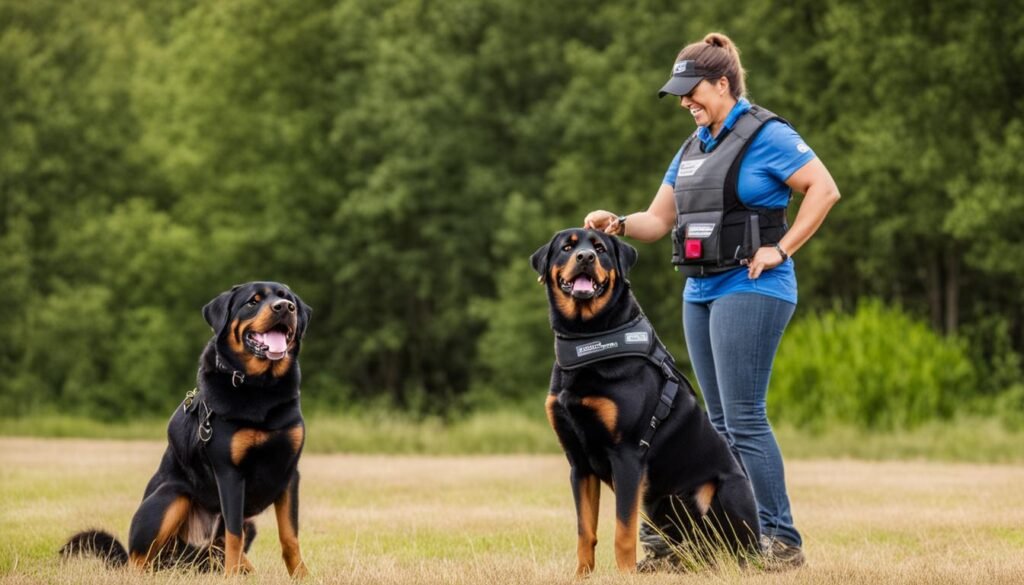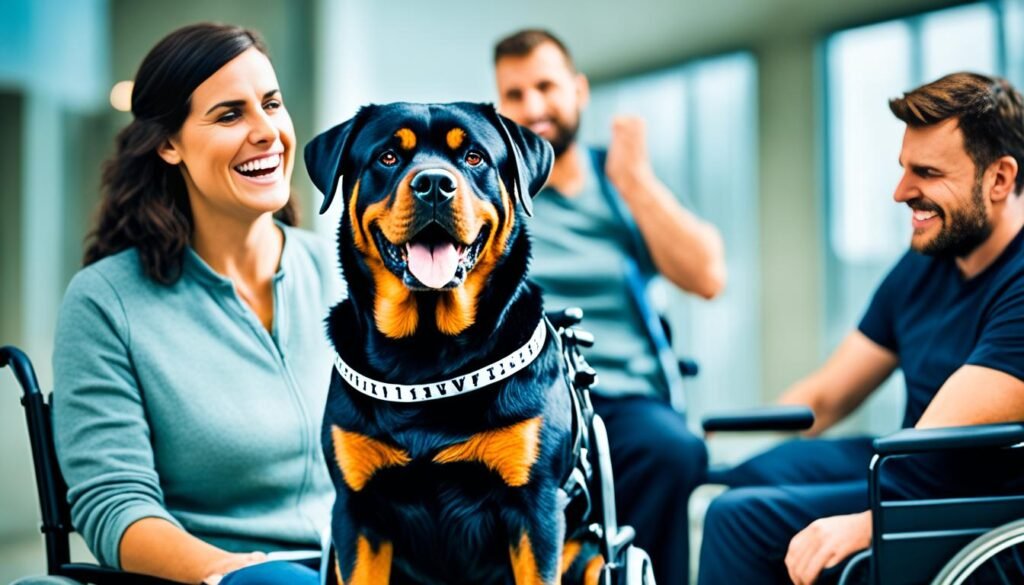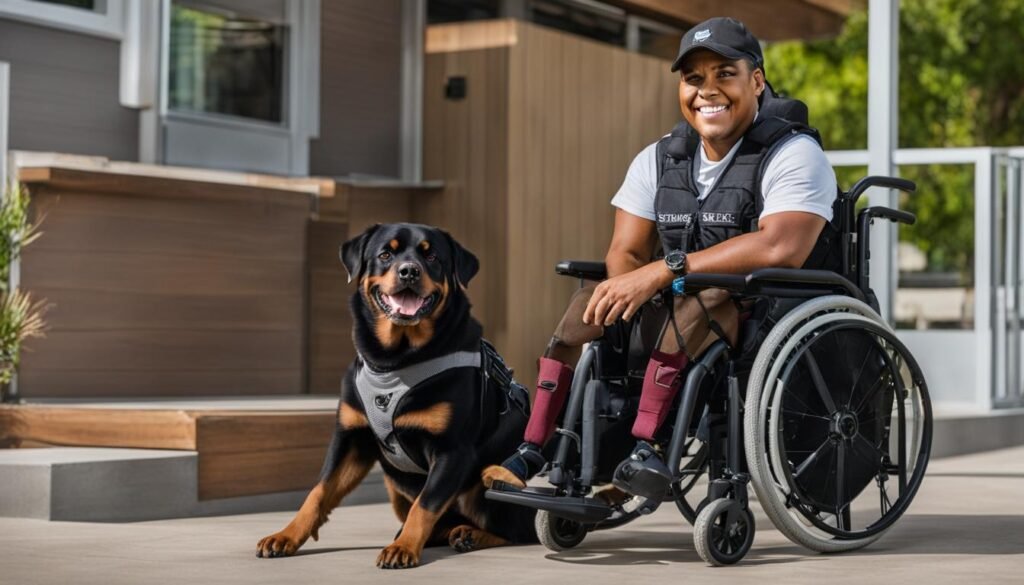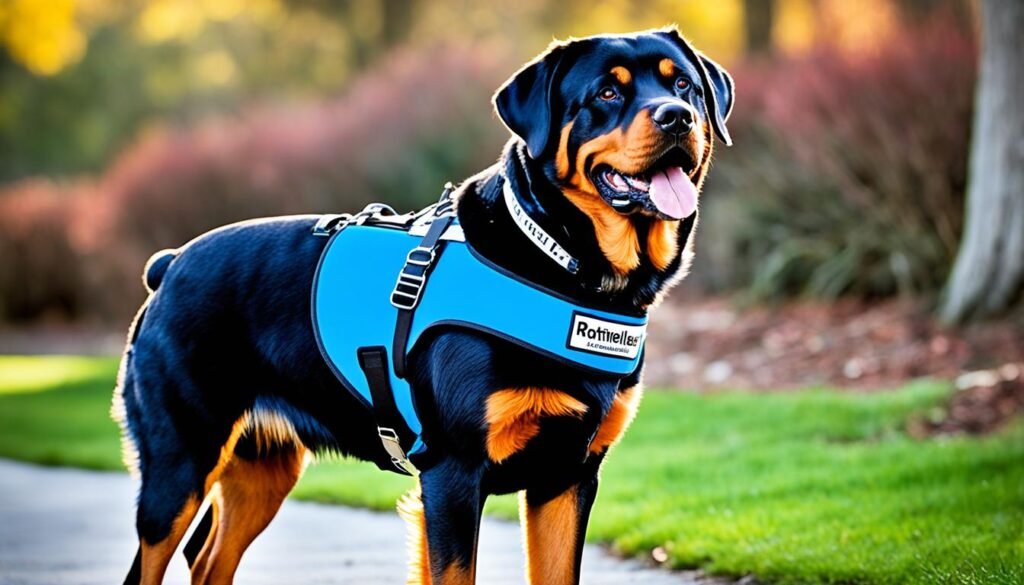Imagine a bustling city street filled with people going about their daily routines. Among the crowd, a person with a disability navigates their way with the help of a loyal four-legged companion by their side. Meet Max, a Rottweiler service dog who has dedicated his life to assisting his owner, Sarah, with her mobility challenges.
Max and Sarah’s story began when Sarah was diagnosed with a chronic condition that affected her ability to walk independently. Faced with the daily struggle of maintaining her mobility, Sarah decided to explore the option of getting a service dog. After careful consideration and research, she discovered that Rottweilers have the potential to be excellent service dogs due to their loyalty, intelligence, and physical capabilities.
Max was trained rigorously to perform a variety of tasks to assist Sarah in her daily life. From helping her maintain balance while walking to retrieving objects she couldn’t reach, Max proved to be a reliable and devoted companion. His calm demeanor and gentle nature made him the perfect fit for Sarah, providing not only practical assistance but also emotional support.
Through their experiences together, Max and Sarah have shown the immense benefits of having a Rottweiler as a service dog. Max’s presence in Sarah’s life has opened doors and enabled her to engage in activities she once thought were impossible. With Max’s assistance, Sarah has regained her independence and confidence, allowing her to lead a more fulfilling life.
The journey of Max and Sarah exemplifies the potential of Rottweilers as service dogs. With the right temperament, training, and socialization, these remarkable dogs can make a profound difference in the lives of individuals with disabilities. Whether it’s providing mobility aid, alerting to medical emergencies, or offering comfort, Rottweilers have the capacity to excel in their service dog roles.
Follow along as we explore the world of Rottweilers as service dogs, delving into their history, temperament, training requirements, and the important role they play in enhancing the lives of their owners. Discover why Rottweilers are a viable choice and break free from the limitations of preconceived notions.
Key Takeaways:
- Rottweilers have the potential to be excellent service dogs with the right temperament, training, and socialization.
- They are highly loyal, intelligent, and trainable, making them perfect for individuals who need assistance.
- Rottweilers can perform tasks such as mobility and balance aid, object retrieval, danger or intruder notification, medical emergency alert, and deep pressure therapy.
- With the right training and temperament, Rottweilers can be friendly and well-behaved.
- Through proper training and socialization, Rottweilers can excel as service dogs, providing valuable support and companionship to individuals with disabilities.
The History of Rottweilers
Rottweilers have a fascinating history that dates back to ancient times. It is believed that these loyal and versatile dogs originated from ancient Rome and were brought to Europe by the Romans as they conquered new territories. The Romans realized the value of these dogs and utilized them for a variety of purposes.
Herding Dogs: Rottweilers were initially used as herding dogs, tasked with managing and moving livestock. Their strong and powerful build, coupled with their intelligence and natural herding instincts, made them invaluable in this role.
Transportation Dogs: Another important role of Rottweilers in antiquity was the transportation of livestock and goods. They were trained to pull carts and carry provisions, proving their strength and reliability in this demanding task.
War Dogs: As time went on, Rottweilers began to play a significant role in warfare. They were utilized as war dogs due to their strength, loyalty, and protective nature. Rottweilers served alongside soldiers, providing both companionship and protection on the battlefield.
Police Dogs: The history of Rottweilers also includes their role as police dogs. Their natural instincts for guarding, coupled with their intelligence and trainability, made them well-suited for work in law enforcement. Rottweilers have helped police forces around the world in tasks such as tracking, search and rescue, and apprehending criminals.
Throughout history, Rottweilers have consistently demonstrated their usefulness and loyalty to humans. These dogs have adapted and evolved to meet the changing needs of society, proving themselves as versatile and reliable companions.
Image: Rottweiler History
Rottweiler Temperament and Personality

When it comes to temperament and personality, Rottweilers are known for their impressive qualities. These dogs have a calm, courageous, and confident nature that endears them to their families and owners.
Rottweilers are loyal and protective, making them excellent guardians for their loved ones.
With their natural instinct for guarding, Rottweilers have the potential to be formidable protectors. However, proper socialization and training play a crucial role in shaping their behavior. When raised in a loving and nurturing environment, Rottweilers can be friendly and well-behaved.
Intelligence is another hallmark of the Rottweiler breed. Their eagerness to please and quick ability to learn make them highly trainable.
Whether it’s obedience training, advanced tasks, or specialized roles, Rottweilers excel in their willingness to work and collaborate. Their intelligence allows them to adapt to various situations and perform their duties with precision.
Overall, the temperament and personality of Rottweilers make them a joy to train and work with. Their calmness, courage, loyalty, and intelligence combine to form a well-rounded breed that can excel in various roles and tasks.
Training a Rottweiler as a Service Dog

When it comes to rottweiler service dog training, these intelligent and trainable dogs have what it takes to excel in their role. Starting training from a young age is crucial for laying a strong foundation. Socialization is equally important to ensure that your Rottweiler is comfortable and well-behaved in various situations.
To train a Rottweiler as a service dog, positive reinforcement methods work wonders. Rewarding desired behaviors with treats or verbal praise helps them understand what is expected of them. Consistency in training is key, as Rottweilers thrive in structured environments.
Patience is a virtue when training a Rottweiler as a service dog. Some Rottweilers may take longer to learn certain tasks, so it’s important to be patient and allow them to progress at their own pace. Training sessions should be kept short and engaging to keep them interested and focused.
Rottweiler Service Dog Training Tips:
- Start training your Rottweiler as early as possible to instill good behaviors and habits.
- Expose your Rottweiler to different environments, people, and animals to ensure they are well-socialized.
- Use positive reinforcement techniques such as treats, praise, and play as rewards for good behavior.
- Be consistent in your training approach to establish clear expectations and boundaries.
- Practice patience and understanding, as each Rottweiler learns at their own pace.
- Enroll in obedience classes or work with a professional trainer who has experience in service dog training.
- Continue to reinforce and maintain the skills learned through regular training and reinforcement sessions.
Training a Rottweiler to be a service dog requires dedication, time, and effort. It’s a journey that requires ongoing commitment on your part. However, with the right approach and a focus on positive reinforcement, your Rottweiler can develop the skills and behaviors necessary to excel as a service dog.
Rottweiler Health Issues

While Rottweilers are generally healthy dogs, they can be prone to certain health conditions. It’s essential for owners to be aware of these common health problems in Rottweilers to provide the best care and attention to their furry companions.
Hip and Elbow Dysplasia
Hip dysplasia and elbow dysplasia are common orthopedic conditions in Rottweilers. These conditions occur when the joints of the hips and elbows develop abnormally, leading to pain, lameness, and difficulty in movement. Regular vet check-ups, appropriate exercise, and a balanced diet can help manage these conditions.
Gastric Dilatation-Volvulus (GDV)
Gastric dilatation-volvulus, also known as bloat, is a potentially life-threatening condition that affects deep-chested breeds like Rottweilers. It occurs when the stomach fills with gas and twists on itself. Immediate veterinary attention is crucial if bloat is suspected, as it can rapidly progress and lead to organ damage. Preventive measures such as feeding multiple small meals, avoiding exercise after meals, and using elevated feeding stations can help reduce the risk.
Aortic Stenosis
Aortic stenosis is a congenital heart condition that affects the flow of blood from the heart to the body. It can cause symptoms such as fainting, fatigue, and difficulty in breathing. Regular cardiac evaluations and monitoring are important in detecting and managing aortic stenosis in Rottweilers.
Osteosarcoma
Osteosarcoma is a common bone cancer that affects Rottweilers. It usually develops in the limbs and can cause lameness, swelling, and pain. Prompt veterinary care and early detection are vital in addressing osteosarcoma and improving the chances of successful treatment.
Regular vet check-ups, proper nutrition, exercise, and a safe environment play a significant role in maintaining the overall health and well-being of Rottweilers. By staying proactive and addressing any health concerns promptly, owners can ensure their Rottweilers live a happy and healthy life.
Caring for Your Rottweiler

Proper care is essential to ensure the health and well-being of your Rottweiler. Follow these guidelines for feeding, grooming, and overall care to keep your Rottweiler happy and thriving.
Feeding
Feeding your Rottweiler a balanced diet is crucial for their overall health. Choose high-quality dog food that meets their nutritional needs. Consult with a veterinarian to determine the appropriate portion size based on your Rottweiler’s age, weight, and activity level. Regular feeding times and avoiding overfeeding will help maintain a healthy weight and prevent obesity, which can lead to various health problems.
Grooming
Grooming your Rottweiler is necessary to keep their coat and skin in good condition. Regular brushing not only removes dead hair but also helps distribute natural oils, keeping the coat shiny and healthy. Use a grooming brush suitable for your Rottweiler’s coat type. Bathing should be done occasionally, as frequent bathing can strip the natural oils from the coat. Remember to use dog-friendly shampoo and thoroughly rinse to prevent skin irritation. Regular nail trimming and ear cleaning are also essential parts of grooming.
Exercise and Mental Stimulation
Rottweilers are active dogs that require regular exercise to keep them physically and mentally stimulated. Provide daily walks, play sessions, and opportunities for them to run and explore in a secure environment. Engaging in activities such as obedience training, agility training, or playing interactive games can help keep their minds sharp and prevent boredom. Remember to monitor their exercise to avoid overexertion, especially in hot weather.
Dental Care
Good dental hygiene is crucial for the overall health of your Rottweiler. Brush their teeth regularly using a dog-specific toothbrush and toothpaste. Dental chews or toys designed to promote dental health can also help reduce plaque and tartar buildup. Regular dental check-ups with a veterinarian are recommended to address any dental issues early and ensure your Rottweiler’s oral health.
Creating a Safe and Loving Environment
Providing a safe and loving environment is essential for the well-being of your Rottweiler. Make sure your home is secure, with fenced areas or appropriate containment to prevent them from wandering off. Provide comfortable bedding and a designated space where your Rottweiler can relax and feel safe. Show them love, attention, and positive reinforcement to strengthen the bond between you and ensure their emotional well-being.
Rottweilers as Working Dogs

Rottweilers are highly versatile and excel in various working roles, showcasing their remarkable abilities and strong work ethic. With their intelligence, loyalty, and physical capabilities, Rottweilers are well-suited for a wide range of job assignments.
Rottweilers can be trained as service dogs, providing invaluable assistance to individuals with disabilities. Through their rigorous training, they are able to perform tasks such as mobility assistance, object retrieval, and medical alert, enhancing the independence and quality of life for those in need.
In addition to service work, Rottweilers can also serve as therapy dogs, offering comfort and emotional support to individuals in hospitals, nursing homes, and other therapeutic environments. Their calm and affectionate nature, combined with their physical strength, enables them to provide deep pressure therapy, a technique that can help alleviate anxiety and stress.
Rottweilers are known for their obedience and can excel in competitive obedience trials, showcasing their discipline and precision. Their trainability and eagerness to please make them a popular choice among obedience competitors.
Furthermore, Rottweilers can be trained as guide dogs for individuals with visual impairments, guiding them safely through their daily routines and improving their mobility and independence. Their intelligence and attentiveness allow them to navigate obstacles and ensure their handler’s safety.
Customs inspection is another area where Rottweilers can demonstrate their abilities. With their keen sense of smell and sharp instincts, they can be trained for narcotics or contraband detection, assisting law enforcement agencies in maintaining security and preventing illicit activities.
Rottweilers also excel in drafting and carting tasks, utilizing their strength and endurance to pull heavy loads. These working activities not only provide physical exercise but also tap into their innate desire to work and contribute.
Rottweilers as Therapy Dogs

Rottweilers can be wonderful therapy dogs, providing emotional support and comfort to individuals in need. Their calm and affectionate nature makes them well-suited for this important role. Whether it be visiting patients in hospitals, nursing homes, or participating in therapy programs, Rottweilers have the ability to bring joy and healing to people’s lives.
Rottweilers, with their gentle demeanor and natural empathy, can provide emotional support to those struggling with mental health issues or emotional distress. Their unconditional love and companionship can have a profound impact on individuals, offering solace during times of difficulty.
One of the unique qualities of Rottweilers is their size and strength, which can be beneficial in certain therapy tasks. They are well-suited for deep pressure therapy, a technique that involves applying gentle pressure to alleviate anxiety and promote relaxation. Rottweilers can provide this physical comfort by leaning gently against a person or sitting close by, creating a calming effect.
As therapy dogs, Rottweilers are trained to be well-behaved, patient, and responsive to their handlers’ cues. They undergo rigorous training and socialization to ensure they are comfortable and adaptable in various environments. This training equips them to navigate stressful situations with ease, making them ideal companions for therapy work.
It is important to recognize the invaluable contribution that Rottweilers make as therapy dogs. Their unwavering loyalty, gentle nature, and ability to provide emotional support and comfort make them a cherished presence in therapeutic settings.
The Benefits of Rottweiler Therapy Dogs:
- Emotional support and comfort
- Physical reassurance through deep pressure therapy
- Ability to navigate challenging environments
- Unconditional love and companionship
Overcoming Stereotypes

Rottweilers have often been associated with negative stereotypes, but these misconceptions do not define the breed. With proper training and socialization, Rottweilers can be friendly, gentle, and loving companions. It is important to educate people about the true nature of Rottweilers and challenge the stereotypes that exist.
Despite their reputation, Rottweilers are capable of forming strong bonds with their owners and are fiercely loyal. They are known for their protective nature, which makes them excellent family pets. Rottweilers can be socialized to interact well with other animals and people, ensuring they are well-rounded and well-behaved companions. By focusing on positive training techniques and providing them with a loving and structured environment, Rottweilers can overcome any negative stereotypes.
It is essential to recognize that each Rottweiler is an individual and should be judged based on their own behavior and personality, rather than preconceived notions. Stereotypes should not dictate our perception of these incredible dogs; instead, we should celebrate their unique qualities and dispel any misconceptions. Let’s embrace the truth about Rottweilers, their potential as loving and loyal companions, and challenge the stereotypes that unjustly overshadow their reputation.
Can Rottweilers Be Service Dogs?

When considering a service dog, many people wonder if a Rottweiler can fulfill this important role. The answer is yes! Rottweilers have the potential to be excellent service dogs, thanks to their strong build, intelligence, and loyalty. With proper training, socialization, and the right temperament, Rottweilers can perform a variety of tasks that can greatly assist individuals with disabilities.
One of the key requirements for a service dog is their ability to provide mobility assistance. Rottweilers, known for their physical strength, can be trained to help individuals with limited mobility. They can provide balance and stability support, help with tasks such as opening doors or retrieving objects, and even assist in wheelchair pulling. This can greatly enhance the independence and daily functioning of someone in need.
Additionally, Rottweilers are highly intelligent and can be trained to perform essential tasks related to medical alert. They have the ability to detect certain medical emergencies, such as detecting changes in blood sugar levels for individuals with diabetes or sensing an impending seizure for those with epilepsy. This early warning system can provide critical time for the individual to take necessary precautions or seek appropriate medical help.
Rottweilers’ loyalty and protective nature also make them ideal candidates for service dog roles. They can offer a sense of security and provide comfort for individuals who may experience anxiety or fear in certain situations. Rottweilers can act as a calming presence, helping their owners navigate through challenging environments with confidence.
It’s important to note that in order for a Rottweiler to serve as a service dog, they must meet specific requirements. They need to undergo comprehensive training that focuses on obedience, task-specific skills, and proper behavior in various settings. Rottweilers must be well-socialized to ensure they can interact safely and appropriately with different people, animals, and environments.
Service dog certification also plays a crucial role in identifying a Rottweiler as a legitimate service dog. While it is not a legal requirement in the United States, certification can help validate a dog’s training and behavior, ensuring a higher level of trust and acceptance in public spaces.
In conclusion, Rottweilers have the potential to be exceptional service dogs, thanks to their physical attributes, intelligence, and loyalty. With the right training, socialization, and temperament, they can fulfill tasks such as mobility assistance, medical alert, and emotional support, providing valuable support and companionship to individuals with disabilities. If you are considering a Rottweiler as a service dog, ensure you meet the necessary requirements and invest in their training to unlock their full potential.
Conclusion
Rottweilers are an exceptional choice as service dogs due to their unique combination of loyalty, intelligence, and physical capabilities. With the proper training and socialization, these remarkable dogs can excel in their role, providing invaluable support and assistance to individuals with disabilities.
One of the key benefits of using Rottweilers as service dogs is their unwavering loyalty. Once bonded with their owner, Rottweilers form a strong and deep connection, always prioritizing their well-being and safety. This loyalty translates into a heightened sense of responsibility, making them reliable partners in navigating daily challenges.
Another advantage of Rottweiler service dogs is their remarkable intelligence. They possess a sharp learning ability and can quickly grasp complex commands and tasks. This makes them highly trainable, ensuring their effectiveness in carrying out specific service dog duties tailored to each individual’s needs.
Moreover, Rottweilers’ physical capabilities enable them to perform a wide range of tasks, including mobility assistance, object retrieval, and medical alert. They have a robust build and powerful presence, allowing them to provide stability and reliable support to individuals with mobility impairments.
In creating a more inclusive society, it is crucial to recognize the untapped potential of Rottweilers as service dogs while challenging any preconceived stereotypes that may limit their abilities. By embracing their unique qualities and providing them with appropriate training and socialization, Rottweilers can contribute significantly to the independence and well-being of people with disabilities.
